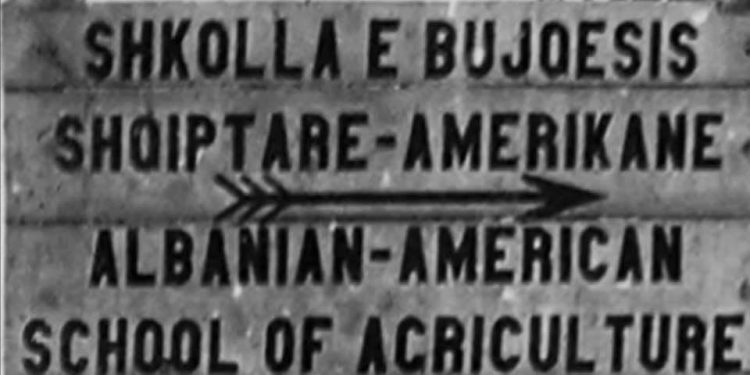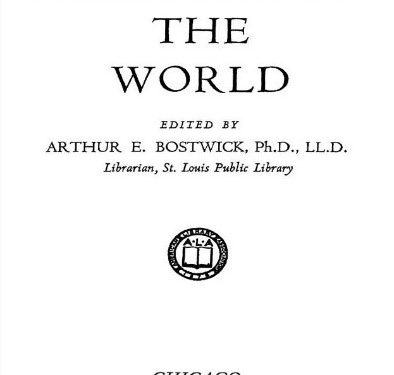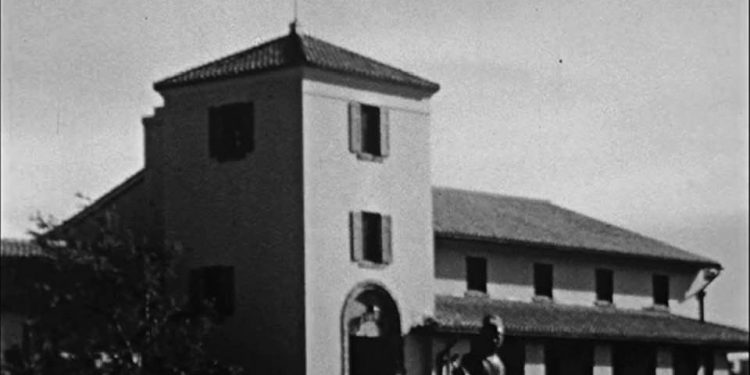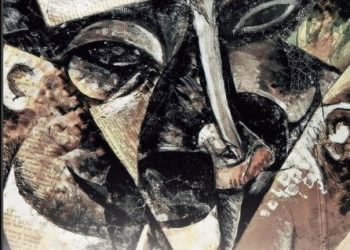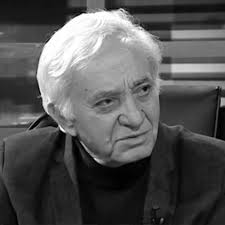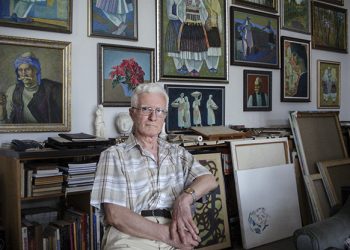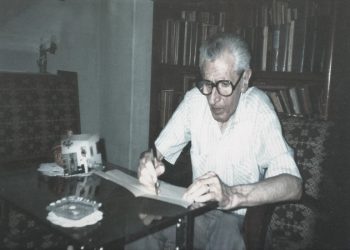 By Mal Berisha
By Mal Berisha
For years I have been studying the activity of the American Charles Telford Erickson, for the benefit of Albanians. I have published a biographical book about him, I have translated his work for Albanians, I have given TV interviews, I have made presentations about his life until I have created an extensive collection about his work. The collection consists of dozens of materials that give meaning to the benevolent, pro-American and patriotic mass, throughout the Albanian force in the Balkans and in the world for his love for us. Every time I come across a document that proves for the thousandth time that man’s devotion to our country, I am “disappointed”, as my hope that I have studied him exhaustively “falls”. This is what happened again, when I saw that in 1933, he introduced Albania in one of the most prestigious American publications, entitled “People’s Libraries of the World”.
Erickson’s contribution in this regard is indisputable, although his knowledge of the state of libraries in Albania at that time seems to have been somewhat limited. He has failed to mention the fact that in some cities like Shkodra and Elbasan they had libraries as early as the 19th century, and that the Albanian National Renaissance had started writing modern Albanian as early as 1836 with Milosao and De Rada. this article, on May 12, 1929, the Carnevon Library was established on St. George Street in Tirana. A little later, in 1932, the Public Library “Marin Barleti” was opened in Shkodra, which the citizens called “Milet Bahçe”. Shkodra had libraries of Jesuit fathers since 1858 and those of the Franciscans since 1875, while there was also a library of the High Madrasa near the Castle, of 1860. The Turtulli Library was opened in Korça in 1927. In fact, the National Library of Albania dates back to July 10, 1920 with a nucleus of a fund called “Library of the Albanian Literary Commission”.
In the spring of 1931, the book states, the Committee on International Relations of the American Library Society submitted a recommendation to its Board, which included a request for several publications on the state of libraries in various parts of the world. The suggestion was taken into consideration, while Dr. was chosen as the editor. Arthur E. Bostwick, world-renowned librarian and author.
Dr. Bostwick and Dr. W. Bishop, Chairman of the Committee on International Relations, addressed a request to seventy countries of the world to include the description about their popular libraries in that voluminous and prestigious publication. Forty-eight invited countries responded to that request. Albania was the first, in alphabetical order, and this gift was offered to her by her friend, already known, Dr. Charles Telford Erickson, in the capacity of director of the Albanian-American School of Agriculture in Kavaja, Albania.
In his introduction, Dr. Bostwick wrote that the publication of these articles in the book “People’s Libraries of the World” gives a diverse picture of the situation in those countries and reflects the degree of their development in the field of letters and education.
As stated in the book’s introduction, there were libraries in all civilized countries, but the People’s Libraries, as we know them today, were unimaginable before writing and reading spread. The fastest development of these libraries has taken place in the United States and Northern European countries. This huge popularity makes it take as an example and spread all over the world.
Most of the articles in this volume are written by librarians or other professionally interested people in the countries they refer to. They represent the specific characteristics of each country. For example, in places where the People’s Library has been set up, this issue has taken on a primary importance starting from the construction of facilities, equipment and methods adapted to make the books even more usable by readers. There are times when the judgment of the contributors on this issue should have been trusted.
In general, the Public Libraries, described in this publication, are intended to provide a wealth of information and make it accessible to all categories of readers. Undoubtedly, in various places where libraries have long existed for the well-known purpose of study research, there has been no need to set up Public Libraries to duplicate book collections, unless the public does not have access to these particular collections.
In those places where Public Libraries have been set up recently, the tendency has been to provide ordinary readers with books of all categories. What stands out from this whole summary of historical and statistical material is of an essential, democratic character, of the People’s Libraries. In fact, it requires the community of ordinary readers, and not only those who simply understand what they see on the printed pages of letters, but also those who enjoy reading, to be mentally capable of taking advantage of them. . This way has been part of certain efforts and policies to reduce illiteracy and has had a strong impact on achieving this goal.
It should be borne in mind that illiterate people are not necessarily ignorant. Their inability to read does not argue mental inferiority. In China, for example, for thousands of years it is rare to find a woman who can read, but a woman’s life in social and domestic life is very valuable. Reading is not only the means by which culture flows but also the method by which culture comes to man more easily and quickly.
However, illiterates, regardless of their mentality, receive their education from other sources and not just through the written word. The libraries and books within them presuppose literacy, school and knowledge. A place without schools is therefore also a place without libraries. However, there were places with schools but without libraries. In particular there were places with public schools but not with the People’s Library. So was the US, a century ago.
Private, church or corporate libraries have always been preceded by tax-funded libraries. This is because our ideas of public needs, which are rightly supported by our taxes, have greatly expanded the latter. It is difficult to find a town that does not have paved roads, that has no public water supply or unlit streets, but this should also be extended to the construction of Public Libraries, as they are the product of several interactive causes among which, the spread of writing and reading.
There are places in the world where there is no People’s Library at all. In some others, they are beginning to appear. Even where they already exist, even in the most developed countries, they are so unevenly distributed that there is still endless work to be done in this area. There are also places where libraries are subject to severe censorship due to the political stances of the ruling parties.
In fact, much remains to be done in the service of spreading the book through Public Libraries throughout the world. The stories brought together in this publication prove how much work is being done today in this direction.
Arthur E. Bostwick
ALBANIA
Writes Ch. Telford Erickson
DIRECTOR OF THE ALBANIAN-AMERICAN SCHOOL OF AGRICULTURE, KAVAJA, ALBANIA
Albania became an independent European state shortly before the outbreak of World War II and the Peace Conference. Unlike other states, created at that time, it came directly from the Eastern Empire of Turkey, without roots in European and Western civilization.
She had to start the education process from the formulation of her national Alphabet of the Albanian Language.
There was practically nothing in the time span between the fifteenth and twentieth centuries. Schools, textbooks, and even primers in the Albanian language were forbidden. Undoubtedly, what happened to education happened to all areas of life in the country, in agriculture, industry, public health, housing, food, social life, roads and all forms of communication inside and outside the country.
Considering what shortcomings, the country had when it came out of captivity, it has made a lot of noticeable progress. Hundreds of schools have been opened and every teacher has been trained in normal national schools. The public press has become a factor in the intellectual life of the country. One of the most visited stores and where people buy is the place where books are sold. Its owner, Mit’hat Bey Frashëri, left a very important diplomatic post in order to deal with this matter.
About two years ago, a State Library Association was established, which began actively collecting books for a National Library in Tirana. They are especially collecting books that contain documents that deal mostly with that part of their 2000-year-old buried history. Undoubtedly foreign books, European and American, are equally in demand.
In addition, there are two libraries, one from the Red Cross (American) Youth School in Tirana and the school library with which I am affiliated. This library specializes in science, while the other specializes in agriculture, handicrafts and products, handicrafts and handicrafts.
This is what has been achieved so far. The American Library in Paris has contributed very generously, as have several other American libraries, schools, and colleges. To be noted are the aids provided by Mrs. Robert B. Gregory, in Chicago, which has led to a substantial increase in the well-being of our school library.
(Published in Chicago by the American Library Association, 1933)
Note: Today these two American investment monuments in Golem of Kavaja have been degraded and demolished. See photos of 2020. /Memorie.al





